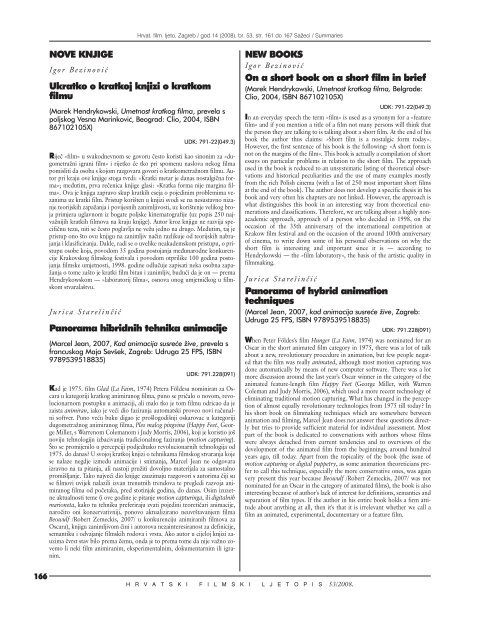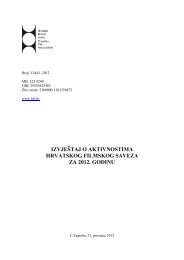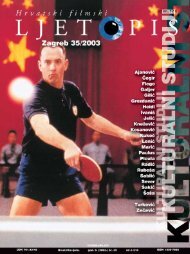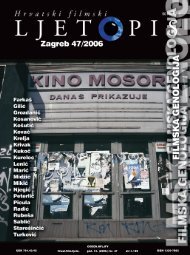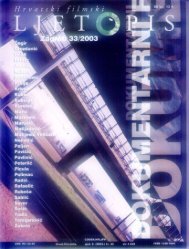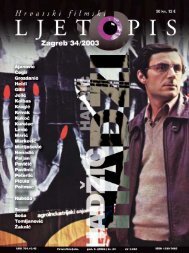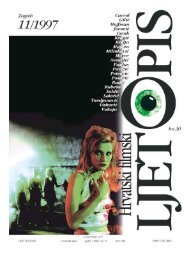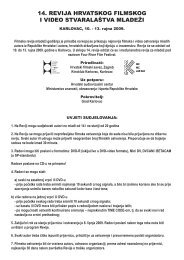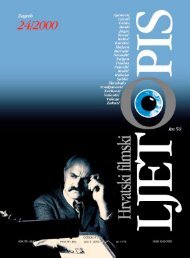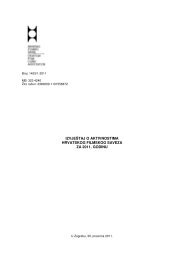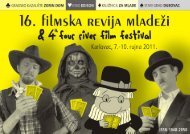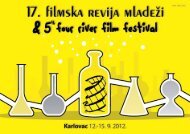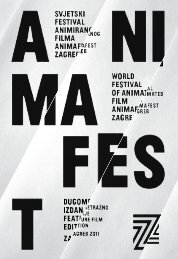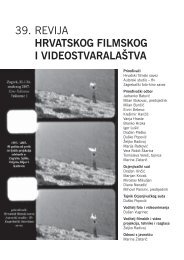Create successful ePaper yourself
Turn your PDF publications into a flip-book with our unique Google optimized e-Paper software.
hfl_<strong>53</strong>.qxp <strong>2008</strong>-04-18 11:08 Page 166<br />
Hrvat. film. ljeto, Zagreb / god 14 (<strong>2008</strong>), br. <strong>53</strong>, str. 161 do 167 Sa`eci / Summaries<br />
NOVE KNJIGE<br />
Igor Bezinovi}<br />
Ukratko o kratkoj knjizi o kratkom<br />
filmu<br />
(Marek Hendrykowski, Umetnost kratkog filma, prevela s<br />
poljskog Vesna Marinkovi}, Beograd: Clio, 2004, ISBN<br />
867102105X)<br />
UDK: 791-22(049.3)<br />
Rije~ »film« u svakodnevnom se govoru ~esto koristi kao sinonim za »dugometra`ni<br />
igrani film« i rijetko }e tko pri spomenu naslova nekog filma<br />
pomisliti da osoba s kojom razgovara govori o kratkometra`nom filmu. Autor<br />
pri kraju ove knjige stoga tvrdi: »Kratki metar je danas nostalgi~na forma«;<br />
me|utim, prva re~enica knjige glasi: »Kratka forma nije margina filma«.<br />
Ova je knjiga zapravo skup kratkih eseja o pojedinim problemima vezanima<br />
uz kratki film. Pristup kori{ten u knjizi svodi se na nesustavno nizanje<br />
teorijskih zapa`anja i povijesnih zanimljivosti, uz kori{tenje velikog broja<br />
primjera uglavnom iz bogate poljske kinematografije (uz popis 250 najva`nijih<br />
kratkih filmova na kraju knjige). Autor kroz knjigu ne razvija specifi~nu<br />
tezu, niti se ~esto poglavlja ne ve`u jedno na drugo. Me|utim, taj je<br />
pristup ono {to ovu knjigu na zanimljiv na~in razlikuje od teorijskih nabrajanja<br />
i klasificiranja. Dakle, radi se o uvelike neakademskom pristupu, o pristupu<br />
osobe koja, povodom 35 godina postojanja me|unarodne konkurencije<br />
Krakovskog filmskog festivala i povodom otprilike 100 godina postojanja<br />
filmske umjetnosti, 1998. godine odlu~uje zapisati neka osobna zapa-<br />
`anja o tome za{to je kratki film bitan i zanimljiv, budu}i da je on — prema<br />
Hendrykowskom — »laboratorij filma«, osnova onog umjetni~kog u filmskom<br />
stvarala{tvu.<br />
Jurica Stare{in~i}<br />
Panorama hibridnih tehnika animacije<br />
(Marcel Jean, 2007, Kad animacija susre}e `ive, prevela s<br />
francuskog Maja Sev{ek, Zagreb: Udruga 25 FPS, ISBN<br />
9789<strong>53</strong>9518835)<br />
UDK: 791.228(091)<br />
Kad je 1975. film Glad (La Faim, 1974) Petera Földesa nominiran za Oscara<br />
u kategoriji kratkog animiranog filma, puno se pri~alo o novom, revolucionarnom<br />
postupku u animaciji, ali malo tko je tom filmu odricao da je<br />
zaista animiran, iako je ve}i dio faziranja automatski proveo novi ra~unalni<br />
softver. Puno ve}u buku digao je pro{logodi{nji oskarovac u kategoriji<br />
dugometra`nog animiranog filma, Ples malog pingvina (Happy Feet, George<br />
Miller, s Warrenom Colemanom i Judy Morris, 2006), koji je koristio jo{<br />
noviju tehnologiju izbacivanja tradicionalnog faziranja (motion capturing).<br />
[to se promijenilo u percepciji podjednako revolucionarnih tehnologija od<br />
1975. do danas? U svojoj kratkoj knjizi o tehnikama filmskog stvaranja koje<br />
se nalaze negdje izme|u animacije i snimanja, Marcel Jean ne odgovara<br />
izravno na ta pitanja, ali nastoji pru`iti dovoljno materijala za samostalno<br />
promi{ljanje. Tako najve}i dio knjige zauzimaju razgovori s autorima ~iji su<br />
se filmovi uvijek nalazili izvan trenutnih trendova te pregledi razvoja animiranog<br />
filma od po~etaka, pred stotinjak godina, do danas. Osim izuzetne<br />
aktualnosti teme (i ove godine je pitanje motion capturinga, ili digitalnih<br />
marioneta, kako tu tehniku preferiraju zvati pojedini teoreti~ari animacije,<br />
naro~ito oni konzervativniji, ponovo aktualizirano neuvr{tavanjem filma<br />
Beowulf /Robert Zemeckis, 2007/ u konkurenciju animiranih filmova za<br />
Oscara), knjigu zanimljivom ~ini i autorova nezainteresiranost za definicije,<br />
semantiku i odvajanje filmskih rodova i vrsta. Ako autor u cijeloj knjizi zauzima<br />
~vrst stav bilo prema ~emu, onda je to prema tome da nije va`no zovemo<br />
li neki film animiranim, eksperimentalnim, dokumentarnim ili igranim.<br />
NEW BOOKS<br />
Igor Bezinovi}<br />
On a short book on a short film in brief<br />
(Marek Hendrykowski, Umetnost kratkog filma, Belgrade:<br />
Clio, 2004, ISBN 867102105X)<br />
UDK: 791-22(049.3)<br />
In an everyday speech the term »film« is used as a synonym for a »feature<br />
film« and if you mention a title of a film not many persons will think that<br />
the person they are talking to is talking about a short film. At the end of his<br />
book the author thus claims: »Short film is a nostalgic form today«.<br />
However, the first sentence of his book is the following: »A short form is<br />
not on the margins of the film«. This book is actually a compilation of short<br />
essays on particular problems in relation to the short film. The approach<br />
used in the book is reduced to an unsystematic listing of theoretical observations<br />
and historical peculiarities and the use of many examples mostly<br />
from the rich Polish cinema (with a list of 250 most important short films<br />
at the end of the book). The author does not develop a specific thesis in his<br />
book and very often his chapters are not linked. However, the approach is<br />
what distinguishes this book in an interesting way from theoretical enumerations<br />
and classifications. Therefore, we are talking about a highly nonacademic<br />
approach, approach of a person who decided in 1998, on the<br />
occasion of the 35th anniversary of the international competition at<br />
Krakow film festival and on the occasion of the around 100th anniversary<br />
of cinema, to write down some of his personal observations on why the<br />
short film is interesting and important since it is — according to<br />
Hendrykowski — the »film laboratory«, the basis of the artistic quality in<br />
filmmaking.<br />
Jurica Stare{in~i}<br />
Panorama of hybrid animation<br />
techniques<br />
(Marcel Jean, 2007, kad animacija susre}e `ive, Zagreb:<br />
Udruga 25 FPS, ISBN 9789<strong>53</strong>9518835)<br />
UDK: 791.228(091)<br />
When Peter Földes's film Hunger (La Faim, 1974) was nominated for an<br />
Oscar in the short animated film category in 1975, there was a lot of talk<br />
about a new, revolutionary procedure in animation, but few people negated<br />
that the film was really animated, although most motion capturing was<br />
done automatically by means of new computer software. There was a lot<br />
more discussion around the last year's Oscar winner in the category of the<br />
animated feature-length film Happy Feet (George Miller, with Warren<br />
Coleman and Judy Morris, 2006), which used a more recent technology of<br />
eliminating traditional motion capturing. What has changed in the perception<br />
of almost equally revolutionary technologies from 1975 till today? In<br />
his short book on filmmaking techniques which are somewhere between<br />
animation and filming, Marcel Jean does not answer these questions directly<br />
but tries to provide sufficient material for individual assessment. Most<br />
part of the book is dedicated to conversations with authors whose films<br />
were always detached from current tendencies and to overviews of the<br />
development of the animated film from the beginnings, around hundred<br />
years ago, till today. Apart from the topicality of the book (the issue of<br />
motion capturing or digital puppetry, as some animation theoreticians prefer<br />
to call this technique, especially the more conservative ones, was again<br />
very present this year because Beowulf /Robert Zemeckis, 2007/ was not<br />
nominated for an Oscar in the category of animated films), the book is also<br />
interesting because of author's lack of interest for definitions, semantics and<br />
separation of film types. If the author in his entire book holds a firm attitude<br />
about anything at all, then it's that it is irrelevant whether we call a<br />
film an animated, experimental, documentary or a feature film.<br />
166<br />
H R V A T S K I F I L M S K I L J E T O P I S <strong>53</strong>/<strong>2008</strong>.


